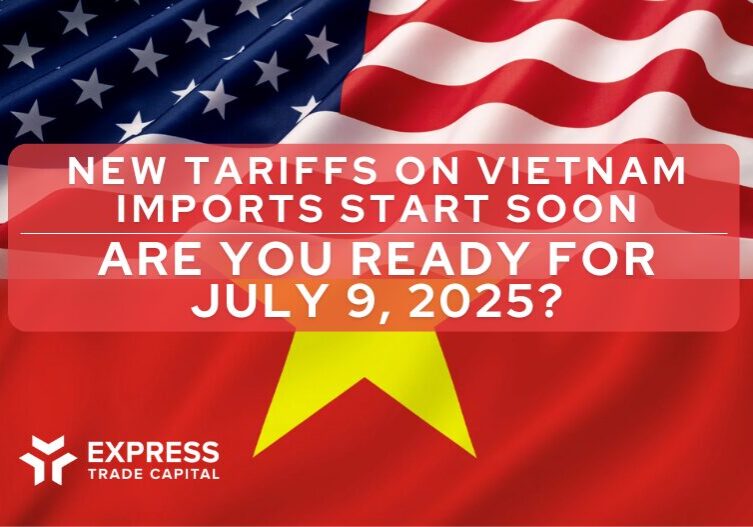Get a free consultation now!
U.S.–Vietnam Tariff Deal 2025: Risks, Legal Questions & Compliance Strategy

The U.S.–Vietnam tariff agreement announced this week may appear to be a diplomatic win, but for importers, exporters, and compliance professionals, it introduces new risks and regulatory ambiguity. With tariff enforcement looming and legal challenges still pending, businesses need more than a headline; they need a plan.
At Express Trade Capital, we help clients understand shifts in trade policy, mitigate exposure, and navigate complex regulations. Here’s our take on the real implications of the U.S.–Vietnam tariff deal and what you should be doing now to protect your margins and supply chain integrity.
What’s in the U.S.–Vietnam Tariff Agreement?
- Vietnamese imports to the U.S. will face a 20% tariff (down from 46% originally proposed).
- Transshipped goods through Vietnam will face a 40% tariff, especially those that don’t meet the “substantial transformation” requirement under U.S. Customs rules.
- U.S. exports to Vietnam will enter the market tariff-free, opening up opportunities for American-made goods in agriculture, energy, and manufacturing.
While 20% is better than 46%, it’s far from insignificant, especially for low-margin import categories like textiles, furniture, and electronics.
When Do the New Tariffs Take Effect?
The administration hasn’t formally announced an effective date. However, a key legal trigger is already in motion:
- The 90-day suspension period for countries listed in Annex I expires on July 9, 2025.
- Unless modified by a new executive order, the new tariff rates will take effect automatically on July 9, 2025
Translation: If you’re sourcing or shipping through Vietnam, assume the new tariffs will apply on July 9, 2025
Legal Foundation: On Shaky Ground
There’s also a legal cloud hanging over the deal. The tariffs are being imposed under the International Emergency Economic Powers Act (IEEPA), a law typically reserved for national security purposes, rather than trade negotiations.
- The U.S. Court of International Trade (CIT) has already ruled these reciprocal tariffs unlawful.
- The case is now under review by the U.S. Court of Appeals for the Federal Circuit, with arguments scheduled for July 31, 2025.
Until the court rules, the tariffs are enforceable, but their future is uncertain. If invalidated, there could be grounds for retroactive refund claims or compliance revisions.
Transshipment Enforcement, But No Playbook
The deal imposes a 40% tariff on transshipped goods, yet leaves the term “transshipment” vaguely defined. Historically, that means anything routed through Vietnam without substantial transformation is in the danger zone.
If your goods pass through Vietnam from China or elsewhere, even for light assembly or relabeling, you’re at risk.
Our POV: This Isn’t Just a Policy Shift, It’s a Compliance Stress Test
We see this as less of a “win” and more of a compliance wake-up call for global traders.
This agreement intensifies enforcement, alters sourcing economics, and introduces legal risk into operations that may have seemed stable just a month ago. Businesses that aren’t prepared will absorb the costs or, worse, face penalties.
What Importers, Exporters & Supply Chain Teams Should Do Now
Here’s how we’re helping clients respond right now:
Audit Country of Origin Documentation
Every item passing through Vietnam should be backed by clear transformation proof. Get declarations from suppliers in writing.
Run Cost Projections for 20% and 40% Scenarios
Even reduced tariffs can wipe out profit if you’re not adjusting pricing and margin strategy. Don’t wait to see the invoice.
Build Compliance Shields Now
Expect more Customs inquiries and port holds. Prepare backup documentation and review the routing history for all shipments bound for Vietnam.
Track the Legal Timeline
The outcome of the July 31 hearing may reshape how these tariffs are enforced or reversed.
Final Takeaway: Right Now, Trade Policy Isn’t Stable. Your Strategy Needs to Be.
This deal reinforces a truth that many companies learned during the U.S.–China trade war: policy can change rapidly, enforcement can be swift, and compliance is no longer a back-office function; it’s a frontline defense.
At Express Trade Capital, we combine trade finance, logistics oversight, and compliance insight in one integrated offering, so when deals like this happen, you’re not just reacting. You’re ready.
Do you have questions about how this agreement may impact your products or supply chain?
Contact our experts today for a confidential risk assessment and tailored funding strategy.
